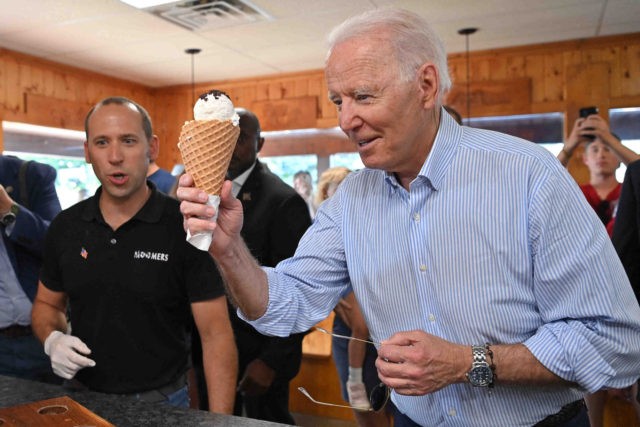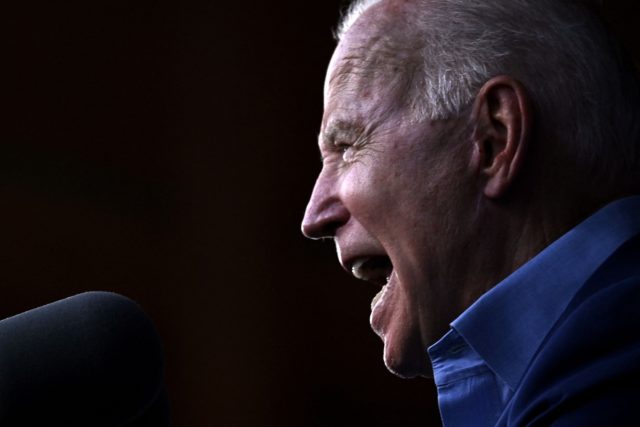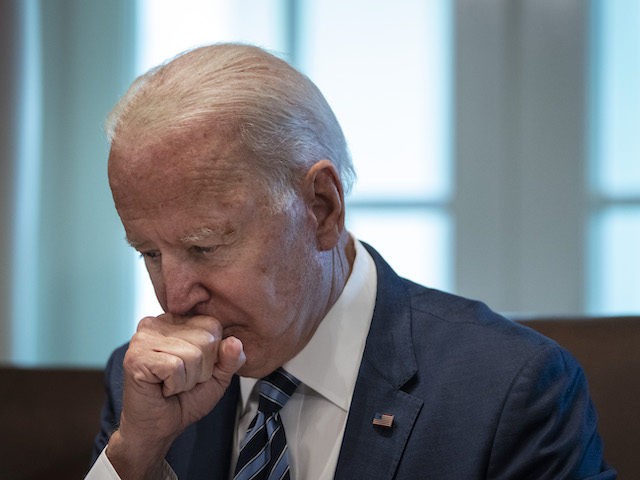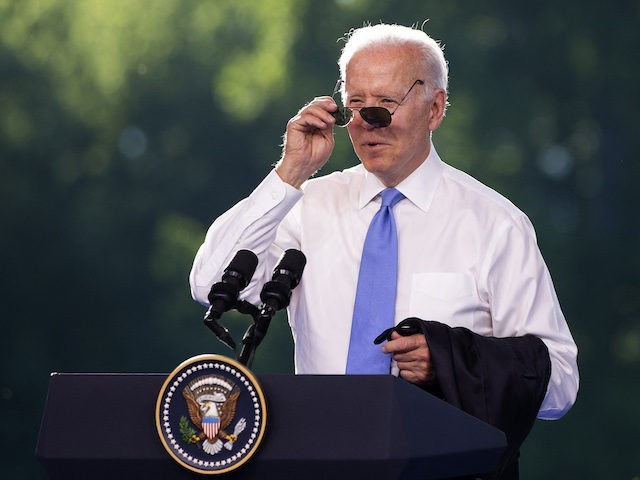Bidenflation: Majority of Americans Say Economy is In Poor Shape

President Joe Biden promised to make life more affordable for middle-class families — and that’s why the recent bout of inflation poses both a political and an economic risk.
Fewer than half of Americans, 45 percent, judge the economy to be in good shape, while 54 percent say it’s in poor shape, according to a new poll from The Associated Press-NORC Center for Public Affairs Research. Views are similar to what they were in AP-NORC polls in June and in March, despite increases in vaccinations and the flow of aid from Biden’s $1.9 trillion coronavirus relief package.
The results suggest that the recent bout of inflation has Americans worried about the economy and their family finances even though the economy has been growing at a rapid clip.
John Novak, a 52-year-old school maintenance worker from Hudson, Wisconsin, is tired of seeing higher gasoline prices and six-month waits to buy a refrigerator. He blames the size of the aid package.
“Everything just costs more, and no one’s really making more other than if you get government money, which I did get some, but I’d rather have prices lower,” said Novak, who voted for President Donald Trump last year. “It’s a tough spot. We’re kind of coming out of this pandemic and then when you pour too much money in you just can’t get enough of what you want.”
The Biden administration is keenly aware that inflation is a potent weapon that could be used politically against Democrats. While pledging to stay vigilant against price increases, officials say that the recent burst reflects the complex nature of restarting an economy that had been shuttered because of the pandemic and that inflation will only be elevated temporarily as a result.
Surveys by Federal Reserve banks of manufacturers show that businesses expect inflation to last for months to come. A survey of manufacturers in Texas released Friday showed that although price hikes were slightly less widespread than a month ago, inflationary pressures remain near record highs in July.
The White House is not inspiring confidence in consumers by denying that the inflation obvious in the aisle of grocery stores, at the gas station, and in appliance stores is a figment of the imaginations of Republican critics.
Instead, the White House drive to politicize inflation and deny its reality is deepening the schism in the American public’s view of the economy. About six in 10 Democrats call the economy good, while three-quarters of Republicans say conditions are poor.
That spills over to how Americans are judging Biden’s handling of the economy, with 52 percent approving and 47 percent disapproving overall. Biden’s approval rating overall is somewhat higher, at 59 percent, as is his approval rating for his handling of the COVID-19 pandemic, at 66 percent.
About 8 in 10 Democrats, but only about 1 in 10 Republicans, approve of Biden on the economy. Republicans are somewhat more likely to approve of Biden’s handling of the coronavirus pandemic (about 3 in 10 do) and even issues like health care and infrastructure (about 2 in 10 do).
Federal Reserve officials have estimated that the economy could grow at roughly 7 percent this year. But the U.S. central bank is also tasked with maintaining price stability—wh9ich it now defines as inflation averaging around two percent over time—and there are signs that the pressures pushing up prices have yet to fade as there are limited supplies of houses, autos, and the raw materials used by many manufacturers.
The solid demand is supposed to lead to additional supply, which can then help inflation ease. But the outlook for inflation that Fed Chair Jerome Powell considers to be temporary has become somewhat more hazy. Consumer prices jumped 5.4 percent for the year ended in June. Stripping out volatile food and energy costs, they’re up 4.5 percent, the biggest increase since 1991.
What’s more, much of the new capital invested into U.S. businesses in recent years have gone to unprofitable younger companies, environmentalist cause companies, and tech giants that do not produce the kinds of products seeing the greatest inflationary pressures. As a result, many manufacturers lack the ability to expand to meet the demand.
“Traditional industrial companies receive such low valuations and their implicit cost of equity is so high, that investors have demanded dividends and buybacks rather than expansion,” hedge fund David Einhorn wrote in a letter to investors Monday. “Investors have been willing to grant nearly unlimited cheap equity to the constituents of the Goldman Sachs Non-Profitable Technology Index (up 99.7% in the last year), but hardly any for companies that make things and their suppliers.”
Even Powell himself at times has sounded unsure of his thesis that inflation will be transitory.
“We don’t have another example of the last time we reopened a $20 trillion economy,” Powell told the Senate Banking, Housing and Urban Affairs Committee this month. “We’re humble about what we understand.”
Joseph Smith, 72 and a retiree in Alexandria, Virginia, said he worries that the constant focus on inflation by Powell and Republicans has been spooking consumers.
“The Fed is sort of hindering the economy by talking about inflation all the time,” said Smith, who supported Biden last year and feels the president has brought “real stability” to the government with his straight talk on the coronavirus and the economy.
Republican lawmakers have blamed Biden’s spending for the inflation and say his plans for another $4.1 trillion in new spending to be paid for through taxes on the wealthy and corporations will only cause prices to keep rising. They frame it as a return to the runaway price increases of the 1970s, even though economists who are concerned about inflation say that’s not the case. But the message is connecting with Republican voters.
“As Joe Biden’s inflation crisis rages, he just can’t stop fueling it with more reckless government spending,” said Florida Sen. Rick Scott, who is chairman of the National Republican Senatorial Committee. “Americans are experiencing 1970s-style inflation again, and it’s because of Joe Biden’s failed economic policies.”
Those kinds of criticisms are being echoed by voters in a sign of the challenge before Biden as he tries to broaden the appeal of his policies.
Gregory Holman, 58, a hotel property manager in Grants Pass, Oregon, said he couldn’t find an affordable used car. He said it was the fault of too much government spending and graded Biden accordingly.
“I’d give him an F,” Holman said. “He’s just a failure at everything he does.”
___
The AP-NORC poll of 1,308 adults was conducted July 15-19 using a sample drawn from NORC’s probability-based AmeriSpeak Panel, which is designed to be representative of the U.S. population. The margin of sampling error for all respondents is plus or minus 3.7 percentage points.
Bidenflation: New Home Sales Unexpectedly Plunge 6.6%

Sales of new homes unexpectedly plunged in June, the third straight month of falling sales.
New home sales fell 6.6 percent in the month to a seasonally adjusted annual rate of 676,000 units, the Commerce Department reported Monday. That followed a 7.7 percent sales decline in May and a 10.1 percent decline in April.
Economists had forecast sales to rise 3.4 percent. The previous three months were also revised lower.
The median price of a new home sold in May was $361,800, up 6.1 percent from a year ago but the lowest since November.
A shortage of homes on the market and rising costs for materials such as lumber and also higher labor costs are fueling higher prices. This appears to be putting homes out of reach of some buyers.
Sales were down 27.9 percent in the Northeast, the smallest market for new homes, to 31,000. They fell 7.8 percent in the South, by far the largest market, to a seasonally adjusted annual rate of 367,000. Sales fell 5.1 percent in the West to 186,000. Sales climbed in the Midwest to
The seasonally‐adjusted estimate of new houses for sale at the end of June was 353,000, the highest in over a year. This represents a supply of 6.3 months at the current sales rate. This is also the highest in over a year. The normal range is between four to 6 months, so this is slightly above average. The all-time low was set during a three months period of last August through October when supply sat at just 3.5 months. Supply has been rising for four months now.
Mortgage rates have fallen sharply in July, which could spur more home buying.
The report on new homes followed news last week that sales of existing homes rose 1.4 percent in June to a seasonally adjusted annual rate of 5.86 million units with the median price of an existing home hitting a record high of $363,300, up 23.4 percent from a year ago.
–The Associated Press contributed to this report.
Gallup: Joe Biden Registers Lowest Approval Rating of His Presidency

President Joe Biden’s approval rating is now at the lowest point of his presidency according to a new poll released by Gallup.
The poll, taken from July 6-21 shows that Biden has a 50 percent approval rating, down six points from a 56 percent rating in June.
Ninety percent of Democrats approved of Biden’s presidency while only 12 percent of Republicans felt the same way. Forty-eight percent of independents approved of Biden’s handling of the White House.
The president has enjoyed high ratings for his handling of the coronavirus pandemic and overseeing the distribution of vaccinations.
Biden now faces questions about his policies as Americans are experiencing growing inflation. The country also faces growing fears about the delta variant of the coronavirus spreading across the country, even infecting vaccinated Americans.
The president also has yet to deliver on a bipartisan infrastructure deal, as negotiations between Republicans and Democrats continue in the Senate. Other issues of concern include the growing number of migrants crossing uninhibited across the Southern border.
Poll: American Optimism of Country’s Direction Falls Nearly 20 Points

Months into Joe Bidens’ presidency, Americans’ optimism regarding the direction of the country has dropped nearly 20 points, a recent ABC News/Ipsos poll found.
ABC News reported on Sunday:
A majority — 55% — of the public say they are pessimistic about the direction of the country, a marked change from the roughly one-third (36%) that said the same in an ABC News/Ipsos poll published May 2. In the early May survey, Americans were more optimistic than pessimistic by a 28-percentage point margin. Optimism is now under water by 10 points. Looking ahead to the next 12 months, fewer than half — 45% — now report feeling optimistic about the way things are going, a significant drop from about two-thirds (64%) in the May poll.
The decrease in optimism has occurred among Democrats, Republicans, and independents.
“Optimism is down about 20 points among Democrats and Republicans and down 26 points among independents. Among Democrats, about 7 in 10 (71%) now say they are optimistic about the direction of the country over the next 12 months,” the outlet said.
Breitbart News reported Friday Biden’s approval rating was at the lowest point of his presidency, according to a poll from Gallup.
“The poll, taken from July 6-21 shows that Biden has a 50 percent approval rating, down six points from a 56 percent rating in June,” the outlet continued:
Biden now faces questions about his policies as Americans are experiencing growing inflation. The country also faces growing fears about the delta variant of the coronavirus spreading across the country, even infecting vaccinated Americans. The president also has yet to deliver on a bipartisan infrastructure deal, as negotiations between Republicans and Democrats continue in the Senate. Other issues of concern include the growing number of migrants crossing uninhibited across the Southern border.
Meanwhile, reducing crime and promoting a strong economy needed to be priorities for Biden, a Thursday poll from the Associated Press-NORC Center for Public Affairs Research found.
“Seventy-one percent of the American population believe promoting economic growth, the opposite of inflation, should be the highest priority for the Biden administration,” according to Breitbart News.
The ABC News/Ipsos poll was performed July 23 through 24, 2021, among a random national sample of 527 adults. The results have a margin of sampling error with 5.0 points, which included the design effect.
No comments:
Post a Comment